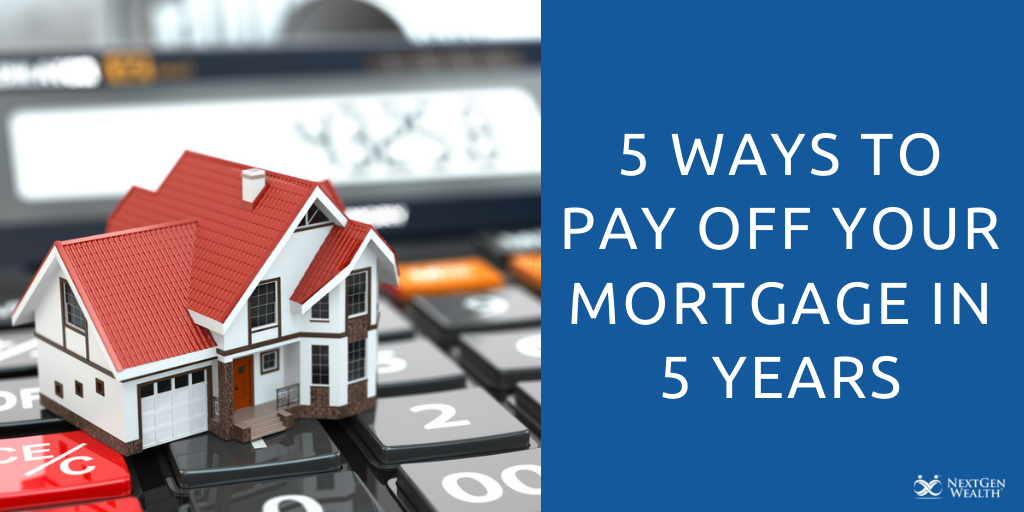5 Ways to Pay Off Your Mortgage in 5 Years
Not everyone wants to spend the next 30 years paying a mortgage. Most of us want the wprivilege that comes with homeownership but feel it’s a lot to have to carry for so long. 
Wouldn’t it be great to be a homeowner and not have to carry the burden of a 30-year mortgage for, well, 30 years? What if you’re pretty close to retirement but still foresee a lengthy mortgage payment in your future?
That might make it a little hard to enjoy retirement to its fullest. So, here are five ways to pay off your mortgage in five years...or at least less than 30 years.
1. Pay It Off Early
Most mortgage loans issued after January 2014, don’t have a penalty for paying off early. This means you can pay extra on your mortgage every month or as often as you want. You can even make a large lump sum payment on your principal each year if you want. Some ways to pay it off early are:
- Make an extra payment on the principal each year when you receive your income tax refund.
- Make one extra mortgage payment per year.
- Divide your monthly payment by 12 and add that amount to each monthly payment. This gives you one extra mortgage payment each year.
- Deposit one-twelfth of the monthly payment into a separate account, then use that to make an additional payment at the end of the year.
- Make half of your mortgage every two weeks. Because of 5-week months, you’ll end up paying extra every year as some months you’ll be paying three half-payments which will equal to at least one full additional monthly payment.
- Make a lump sum amount toward the principal.
Every dollar you put toward your mortgage puts a bigger dent in the principal, which is a good thing. Adding one extra payment per year can take years off your loan term and increases what you save in interest.
For example, let’s say you have a 30-year mortgage for a $220,000 loan with a 4% interest rate. If you paid an additional $1,050 every quarter, you would cut your loan term by 11 years and save more than $65,000 in interest.
2. Refinance for a Shorter Loan Period
Most home loans are for 30 years. If you’ve been paying the mortgage and decided your money needs to be freed up for other purposes, you may want to consider refinancing for a shorter period.
The shorter the loan period for repaying the loan, the higher the monthly payment will be, so really consider your circumstances. Maybe you can’t afford to refinance a loan if you still have 15 years to go.
But if you’re 10 years away or less, it may be worth checking into. Also, a shorter repayment period means less interest over the life of the loan.
3. Recast Instead of Refinancing
You might even want to consider mortgage recasting. Recasting is different from refinancing because you get to keep your existing loan. However, you have to make a lump sum toward the principal.
The bank will then adjust your loan schedule to reflect your new balance (after the lump sum is made). The lump sum will cause you to have a shorter loan period. While you have to pay a closing cost when you do a refinance, there are fees you have to pay associated with recasting.
The difference is tremendous. Recasting involves only paying hundreds of dollars at closing while refinancing usually involves having to pay thousands of dollars.
4. Downsize
Downsizing can be a drastic step, especially if you’ve been living in a house that’s been in your family for years. But if you’re determined to eliminate your mortgage, this may be a viable option for you.
You may be able to purchase the new home outright with the payment you receive for the current home. Should you decide to use this option, remember to not buy more house than you actually need or afford.
Remember, the reason for the downsize—to eliminate a mortgage. However, if you have to take out a mortgage on the new home, make sure it’s a small enough one to pay off within the time frame you desire. Here are some questions to keep in mind when going this route:
- Are you otherwise debt-free with three to six months of expenses saved in an emergency fund?
- Can you make a 10% or 20% down payment?
- Do you have the cash you need on hand to cover closing costs?
- Will the house payment be 25% or less of what you bring home monthly?
- Can you afford to maintain the home?
Your answers to these questions will help you determine if this is a smart move for you. The last thing you want is to do is create another financial strain for yourself.
5. Calculate
If this is a new home for you and you want to pay it off within five years, create a payment schedule to know how much you would need to pay each month to have it paid off in five years.
This will likely be a huge amount, and for most will also be unattainable. However, all situations are unique, and depending on your financial situation, it may be feasible for you. However, you look at it, it will require huge sacrifices in other areas of your finances.
So first things first, set a target date for paying off your mortgage. Once you establish that date, calculate how much you need to pay each month until the mortgage is paid. Your lender may even provide you with an amortization table schedule that outlines how much of the new payment will go towards the principal and how much will go towards the interest.
Committing extra income toward a mortgage is a large feat but possibly attainable if you make a plan and stick to it. Here are some practical tips to help along the way:
- Stop buying lunch and coffee every day: It’s no fun having to sacrifice the good things in life like daily lunches and morning coffee, but if it means you’ll be mortgage-free, it could be worth it. Suppose not buying lunch and coffee frees up $100 each month? That’s $100 more you’ve just found to put toward your mortgage.
- Cut spending in other areas: Consider negotiating or reducing spending in areas where you have variable expenses like cable, phone, and streaming services. This may hurt, but it’s not permanent, just until your mortgage is paid off.
- Use coupons: Couponing is a big deal for many families and can save hundreds of dollars a month if done correctly. Learn how to properly do couponing.
- Stick to a budget: As you devise your new monthly budget, remember to stick to it. It’s the only thing getting you closer to being mortgage-free.
- Rather than reducing spending, you may want to add the additional income you need by bringing in another stream of income. Check out other ways you can save money.
Questions to Ask Before Paying Off Your Mortgage Early
Ultimately, your financial situation and your financial goals will help to determine if paying your mortgage off early is in your best interest. How you answer these questions may help guide your decision:
- How long do you envision being in your home? If you do plan to sell, it may not be worth it to refinance or pay down the mortgage.
- How much money do you have on the side to work with? You’ll need money to pay down the mortgage and incorporate with your other financial goals.
- What type of mortgage interest would you qualify for if you refinanced? What’s the situation with your credit score or your debt-to-income ratio? You want to ensure the lowest interest rates possible.
- Do you have a suitable emergency fund? This needs to be in place before paying more out of pocket on a mortgage.
Conclusion
If you’re in the process of making financial decisions like this, it’s important to know this is not a decision to make lightly because it plays heavily on your overall finances. Speaking with a financial advisor is usually a smart thing to do.
Most financial experts would tell you to put any extra money you would put into a mortgage into an appropriate retirement account, but not all situations are the same.
Your circumstances are unique and deserve to be looked at carefully. That’s why at NextGen Wealth, we provide you with a free financial assessment to have a better understanding of your financial situation.
We help you prioritize your goals, plan for retirement, invest and plan for all your financial milestones in life. But it first starts with awareness of your needs. Your home is one of your biggest assets. To keep it at that, you want to ensure you’re making the right financial decisions when it comes to it.
Contact NextGen Wealth so we can get the conversation started about your mortgage and your overall financial health.


